- Home
- Jessie Haas
Skipping School Page 2
Skipping School Read online
Page 2
“Yes, Hugh, reprehensible. But—if I could just advise you—you’ll be dealing with this for the next thirty years. You can’t afford to get so personally involved—”
“I’m not sure I can afford the thirty years! My God … the greyhounds are bad enough. But at least they get some life! They get a few years before they’re used up and thrown away. But—”
Dr. Rossi’s sad eyes strayed past him. “Oh. Hello, Phillip.”
“Hi,” said Phillip. “Cages?”
“Yes,” said Dr. Rossi.
Phillip was the peon here, the one who did the dirtiest jobs, physically and morally: from cleaning litter boxes to restraining animals for killing, from sweeping and mopping to stoking the incinerator with trash and sometimes bodies. On good days he loved his job, days when no greyhounds from the local racetrack had to be killed simply because they weren’t fast enough; when there were no abandonments; when the tragedies were simple, natural, sometimes fixable. Phillip was interested in fixable tragedies.
The dog cages were empty today. No greyhounds.
But the cat cages were full. He got the garbage pail and started to empty litter boxes. In the office Dr. Franklin spoke again, more quietly.
“Madeline. Couldn’t you …”
“No,” said Dr. Rossi gently. “I can’t keep them past tomorrow. There’s always another litter coming, and you know I can’t keep them all.”
“But what are we doing to ourselves? Can we just keep killing all these animals? It’s not even to end suffering! It’s just throwing them away! Can we keep on doing this for thirty years and not turn into monsters?”
Dr. Rossi’s voice dropped to a murmur.
“I know he’s in the next room! He’s not a child! He’s got the same questions I do!”
“Well, for God’s sake don’t ask me!” cried Dr. Rossi. “I don’t know!”
“But you go ahead and do it anyway?”
“Yes, Hugh, yes! And so do you, and so does Phillip! And I go home and cry about it—but you won’t make me cry here and now! I’ve got work to do!” Phillip heard the chair scrape back, and a moment later the door to the waiting room banged shut.
Dr. Franklin came through the back room, cat carrier in hand. His beard was on his chest, his gray eyes wide and thoughtful. He glanced down the row of cat cages and saw Phillip. After a moment’s pause he set the carrier down and went to the last cage, where the litter of kittens had been living for two weeks now. There were three left: little tigers, fat and healthy. Dr. Franklin took them out and managed to cuddle all three against his bearded face.
“Any chance you can take one of these guys, Phil?”
“No,” said Phillip. “I—things are situated so I can’t.”
“That’s right,” said Dr. Franklin. “I remember—you saved a greyhound once, didn’t you, and you gave it away.”
“Yeah.” That was Diana, and he’d given her to Kris.
Dr. Franklin shook his head, an unwise move which waggled his beard enticingly. The kittens’ eyes brightened, and they pounced, heedless of their precarious positions almost six feet in the air.
“Ow!” Dr. Franklin tried to retract his chin. The beard wiggled. Pounce!
“Oh, shit,” Dr. Franklin said suddenly. He dumped the kittens back in their cage and turned away from them. “Bye, Phil.” The door banged shut behind him.
“Phillip?” Dr. Rossi looked through the doorway behind him. “Can you help me with a dog?”
“Just a second. I have to fill the litter boxes.”
“Hurry. The life you save will probably be mine!”
The patient was a large, woolly Airedale with a wound on its hip. Phillip’s job was to hold the dog’s front end after Dr. Rossi had tied its jaws shut with an old nylon, a fancy black stocking with pearly glitters and a seam up the back. Above it the dog’s eyes were sullenly narrow. A growl vibrated in its chest throughout the examination.
“He hates you,” Phillip said.
“And he’s getting to know my scent awfully well,” said Dr. Rossi. “I should have thought to use someone else’s stocking.”
“I can think of a few people,” said his owner, laughing. “I’ll bring you a supply next time!”
Finished with the dog, Phillip returned to the silent room. The laughter, a black, spangled stocking with a seam up the back, the round-limbed bounce and violence of the Airedale were gay and colorful in his head. The blank room with its cream-colored cement walls and big bank of cages seemed to swallow all that. He measured out the cat food, and its dry rattle in the dishes, the can opener, were the only sounds.
But as the heavy scent of cat food rose from the opened cans, cries came from the last cage. A short, fat kitten paw reached out through the grid and groped around blindly. Phillip found himself laughing.
Other cats rose and stroked themselves against the bars, inviting some courtesy in return, or if too sick, if dying, looked at him from sunken eyes as they crouched in the backs of the cages. Phillip’s laughter turned sharp-edged in his throat. But he reached in and touched each sick cat, and two responded with purrs and surprised looks of pleasure. “Yeah, it’s still good,” he said to the last one, as the bony gray head butted up into his palm. “It’s still good.”
He was careful to go back and wash his hands before touching the kittens.
They were frantic for the food, squalling, tumbling over one another, climbing the bars, and reaching out greedily, claws spread wide. Phillip sailed the dish over their heads into the back corner of the cage, and after a few seconds of frantic glancing about, everyone found it.
“Hungry, aren’t they?” said Dr. Rossi, passing behind him. She was bringing Mrs. Farley to see her cat.
This was the gray cat that had purred at Phillip. He had feline leukemia, and after months of flickering up and down, his life-force had abruptly waned. He had been at the clinic for a week, living on injections. Mrs. Farley visited every day.
She brought the frail creature out now and stood holding him, with tears running down her face. The cat seemed uninterested, uncomfortable. He looked toward his empty, featureless cage, as if he wished to return to it.
“I recommend putting him down,” said Dr. Rossi, bravely looking into the woman’s face.
Mrs. Farley shook her head. “No, I couldn’t do that,” she said. “While there’s life, there’s hope.”
There is no hope. Dr. Rossi didn’t say it, but Phillip heard the words somehow hanging in the air.
Mrs. Farley gave her cat a last desperate, gentle hug. She’d come for something that she hadn’t gotten from him, and after he had crept back into the corner of his cage, she stood looking for a moment, in deep frustration. Then she started to leave.
“Better wash your hands first,” suggested Dr. Rossi gently, and then, as Mrs. Farley stood drying: “A woman gave us these poor darlings to dispose of.”
Mrs. Farley looked into the cage. Please, thought Phillip, moving away. Your cat will die, and so will all these kittens. You could save something! Mrs. Farley looked for a moment, saying nothing, and then went away.
CHAPTER FOUR
Phillip walked home.
The wind was slight, but damp, and raised goose bumps on his skin. He pushed his hands deep in his pockets and walked quickly, eyes down, seeing only the flash-flash-flash of his own sneakers in the dark. The thin material of his shirt clung and made him even colder.
The smell of roasting chicken and baked potato rolled out the door on a wave of heat. Phillip passed the kitchen area, where his mother was making gravy, and collapsed in his chair at the table.
“Phillip! Where’s your jacket?”
“School.”
“Well, for goodness’ sakes, go wash up, and put on a sweater! Dinner’s almost ready.”
When he came back, the chicken was on the table, and his mother was slicing off a piece of breast, with the golden, crackly skin. She cut open a potato, and the steam burst forth. She scooped out the potato, buttered it, and
put pats of butter into each half of the skin, then covered it with gravy. She added a spoonful of corn and some bread-and-butter pickles to the plate and carried it around the corner into the living room.
“Carl? Here’s your dinner.” There was the clack of his tray being opened. “Wait, I’ll get you a napkin.” Not a word from his father. The only sound now coming from the living room was the television, turned very low.
“Now, eat that all up, or I’ll feel bad! This is one of the chickens I raised this summer!”
A grunt from his father.
His mother came back around the corner. Her eyes were wide. She gazed at something not in the room, and she watched it as she served Phillip and herself and sat down.
“How was school?”
“Okay. Where’s Thea?”
“She went out.”
That was all the dinner conversation. His mother continued to stare ahead of her, and Phillip ate. He hadn’t been this hungry in months.
“There’s chocolate cake for dessert,” said his mother when Phillip was slowly polishing off his third helping. She was a farm mother. Her whole life was based on feeding people.
Now Phillip was so full he ached; he was drunk with it. He rose from the table and went into the living room.
His father’s plate was hardly touched.
Phillip perched on the rim of the couch, next to a dozen or so pillows needlepointed and embroidered with duck motifs, and looked, as his father did, at the television. The voices were barely audible. His father sat unblinking, never taking his eyes from the set even through commercials. The remote-control device rested on the arm of his chair. Phillip had never seen him change the channel.
“Carl. Please eat your dinner. You need to keep up your strength.”
He looked at the TV tray in slight surprise and did begin to eat, but slowly, dutifully, as if it were hospital food. Phillip watched his father’s hands. The fingers were swollen from years of work, and the palms were still hard, more like tanned leather than normal human skin. But they were pale now, with only a lingering yellowish cast from all the years of sun and frost, dirt, manure, and tractor grease.
He sneaked a look at his father’s face. A brief look; he didn’t like to see the thin, clear tube that came from behind his father’s ear and entered his nostril: the oxygen tube. Only a few weeks ago that had not been necessary.
His father had had cancer, but the doctors operated and took that out. He also had something else, a mysterious lung condition from years of breathing the fumes from manure pits, breathing antibiotic dusts, herbicides, pesticides, cigarette smoke. He was losing ground faster than they’d expected.
“Carl?”
He had left a lot on his plate, but he looked up and said, “Good meal. Thanks.” Tonight he sounded as if he needed to cough, good and hard, and clear his chest.
“Carl …” Phillip’s mother wanted to talk, but there was nothing fresh to say. The two of them had spent all day in this house, with the television murmuring in the corner.
“One of … your chickens?” his father asked. Reaching out with his blunt thumb and forefinger, once as strong as a pair of steel pliers, he pinched off a piece of the golden, seasoned skin and tasted it.
“Yes,” said Phillip’s mother. “But you know, five of that batch of chicks had their legs all crippled up! I think I’ll send away to the place we used back home, next year, and get some good old-fashioned Barred Rocks.”
“Huh.” His father reached toward the chicken again, changed his mind, and pushed the plate away.
“You like the Barred Rocks, don’t you?”
No answer.
“Carl? They’re pretty birds, don’t you think?”
“Hmm? Yeah.” He was looking at the television again.
“Well! What’s on?” asked Phillip’s mother brightly. Phillip got up from the couch and went outside.
The night air felt clean and cool, swelling his lungs. A simple pleasure, unavailable to his father and Mrs. Farley’s cat. Phillip stared off down the row of street lights, wishing he were somewhere else.
It was always like this—worse now, since his sister, Carrie, had left for nursing school. His days were like sandwiches: a huge slice of dry, fluffy boredom on top; another slice of airless suffocation and silence on the bottom; and between, the clinic, a thin spread of life—blood and shit and pain and sometimes, the miraculous flood of health back into an ailing body. It had been a summer job, mainly for relief, and he’d hung onto it because it was the only place, outside soccer class, where anything seemed to happen to him.
Not today, though. Definitely not today.
He crossed the breezeway and opened the garage door.
The garage was stuffed with the overflow of their former life. It had a discarded, musty smell, like the kitchen of the gray house.
In a corner Phillip found what he was looking for. Ax. Chain saw, splitting hammer, wedges. The chain saw was dirty with oil and sawdust, the ax and hammer handles polished by long wear—formidably useful, in this suburban neighborhood that had no use for them. There was also a log from the dying maple they’d cut at the end of summer.
He was all set, then, and he’d wait at the corner tomorrow for Kris’s father. He’d assume he was going to be picked up.…
Thea, the black and white cat, slipped past his legs. Phillip grabbed her before she could disappear into the labyrinth of furniture.
“Time for you to go in.” He dumped her through the kitchen door.
Flick! went her tail. She turned and stalked into the living room.
“Thea!” cried his mother. Thea’s tail went straight up, and her back rose a little. Her gait changed from angry slouch to charmed, and charming, amble.
“Hey, puss!” A whisper from his father, s’s hissing. Thea leaped onto his lap, and his big hands, which had lain idle all day, stroked and stroked her. She lay back on his knee and beamed up into his eyes, purring.
“There, puss, there, puss,” he whispered. “There, puss.”
“We have three kittens at the clinic that somebody dumped,” Phillip said. “I think we have to kill them tomorrow.”
“Oh, dear,” said his mother. No one—not his mother, not his father, certainly not Thea—said, “Bring them home.”
Phillip went and took a warm shower. He left the light off and in the dark turned his face up to the shower head. The water beat on his cheeks and slid down them, and if he had been crying, he would not have felt the tears.
CHAPTER FIVE
In the morning Phillip waited on the corner, his tools in a grain bag and the log at his feet. Wind sneaked through every seam of his clothing, and the world around him went light and dark and light again, as giant clouds sailed majestically before the rising sun. He and Carrie used to turn cartwheels while they waited for the bus at the end of the long farm driveway. Phillip hadn’t felt like doing that in a long time.
Carrie was coming home for the weekend; that was the one thing his mother told him over breakfast, after she asked what he wanted in his sandwich.
The car came. Greg, beside his father, looked out on Phillip in lofty boredom. Kris was in the back, reading. She glanced up with a hard-eyed, don’t-care look. Normally Phillip would have wilted and turned away. This morning he felt brave and strong and flashed her a cheeky grin. He watched her eyes widen and her face flush and saw her eyes falter down to her book. An unexpectedly sad feeling pierced Phillip’s excitement.
I don’t really know you, he thought. And you certainly don’t know me.
Did anyone ever know anyone else? He avoided wondering about his parents and Carrie, but then there was no one left to consider. No one but Thea, and of course he didn’t know her.
On the other hand, it was pleasant to think that he didn’t know Greg and didn’t need to. Count your blessings, Johnson!
The log shed beetles and dark, crumbly bark on the orange carpet. The teacher, troubled and dubious, made Phillip spread newspaper underneath.
He split the log first with wedges, popping it open neatly. It had a nice straight grain. No one had ever seen the heart of this tree trunk before; no one had touched this fresh, bright wood. His father pointed that out once. People always said it about a gemstone newly pried out of the earth, but it was as true of a piece of wood, his father said.
He split the log in quarters with his ax, mainly for the pleasure of it, and split one of the quarters into kindling, mainly for the grade. Kindling he had plenty of.
“See you on the bus,” he said later, passing Kris on the way out of class.
Her eyes were sharp on him. “History,” she contradicted.
He didn’t answer. Everything was tumbled into his grain bag now: jacket and tools, wood, books, and lunch.
The sun was shining through the big front doors. Meeting Mr. Pilewski, the attendance officer, in the hall, Phillip looked him straight in the eye, smiled, and went out unhindered.
He took what he wanted, put the bag in the trunk of Kris’s father’s car, which had been left unlocked for him, and stood there with the lid up, looking around. A couple of people were walking across the parking lot. Phillip put his jacket on and looked busy in the trunk. When he turned again, they were gone, the glass in the big front doors just shivering shut behind them. It was completely quiet now. He was the only person left. He picked up his ax and hatchet and started up the bluff.
When he reached the gray house, Phillip stood on the road for several minutes, looking. The exquisite loneliness of the place brought an ache to his throat. Perhaps he should walk on. It was a house that perhaps should be chance-met by wanderers, not returned to by a person with an ax and his lunch, and matches in an old baby-food jar.
But that feeling left him. The brook began to sound busy, and his eye drifted to the dead tree limbs he’d seen earlier. Time for work.
After the first few strokes the feel of using an ax came back to him—how the weight of the head and the length of the handle, and gravity, do the work for you. How effortless it seems when you do it right, until suddenly you find yourself tired. How your thoughts go away, your feelings go away, and you stand in physical clarity, your body and the ax and the log. Mindless labor. He had been missing it.

 Chase
Chase The Sixth Sense
The Sixth Sense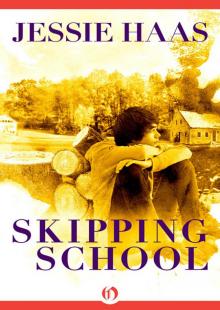 Skipping School
Skipping School Keeping Barney
Keeping Barney Unbroken
Unbroken Westminster West
Westminster West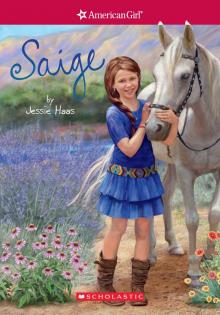 Saige
Saige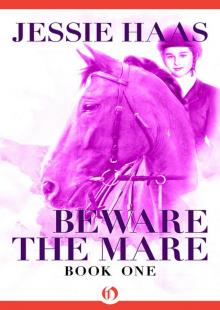 Beware the Mare
Beware the Mare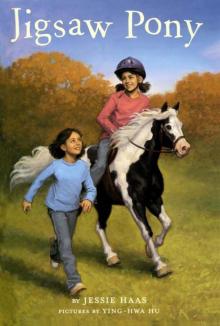 Jigsaw Pony
Jigsaw Pony Rescue
Rescue Saige Paints the Sky
Saige Paints the Sky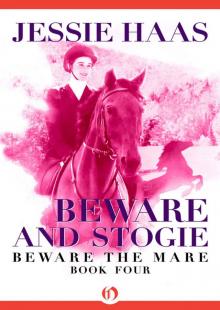 Beware and Stogie
Beware and Stogie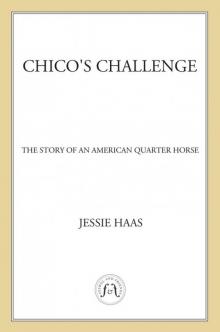 Chico's Challenge
Chico's Challenge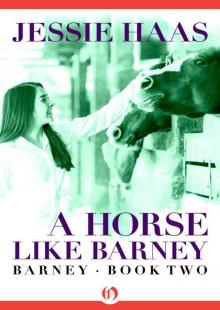 A Horse like Barney
A Horse like Barney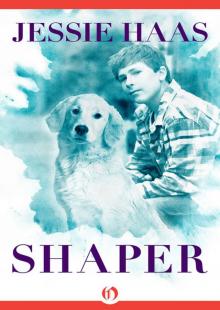 Shaper
Shaper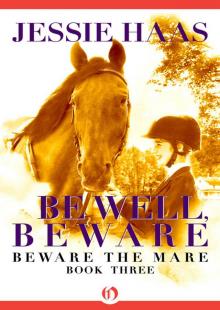 Be Well, Beware
Be Well, Beware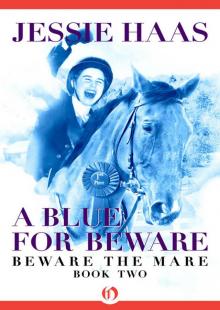 A Blue for Beware
A Blue for Beware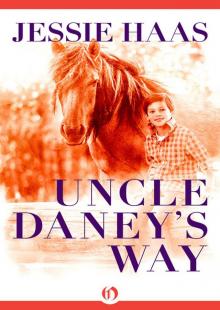 Uncle Daney's Way
Uncle Daney's Way